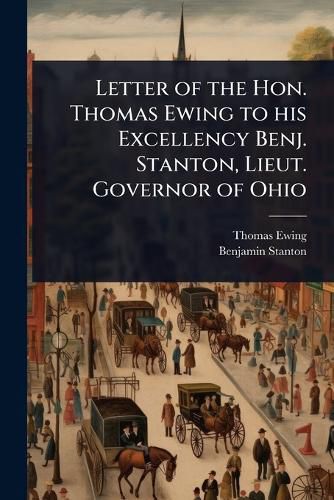Readings Newsletter
Become a Readings Member to make your shopping experience even easier.
Sign in or sign up for free!
You’re not far away from qualifying for FREE standard shipping within Australia
You’ve qualified for FREE standard shipping within Australia
The cart is loading…






This title is printed to order. This book may have been self-published. If so, we cannot guarantee the quality of the content. In the main most books will have gone through the editing process however some may not. We therefore suggest that you be aware of this before ordering this book. If in doubt check either the author or publisher’s details as we are unable to accept any returns unless they are faulty. Please contact us if you have any questions.
In "Letter of the Hon. Thomas Ewing," Ewing responds to charges leveled by Ohio Lieutenant Governor Benjamin Stanton against the generals who fought at the Battle of Shiloh. This document offers a valuable perspective on the controversies and debates surrounding the battle, which took place on April 6, 1862. Ewing's detailed response provides insights into the military strategies, leadership decisions, and political ramifications of one of the Civil War's bloodiest engagements.
This letter is a crucial historical artifact for understanding the complexities of Civil War command and the intense scrutiny faced by military leaders during this tumultuous period. It sheds light on the political climate of Ohio during the war and the ways in which military events influenced state politics.
This work has been selected by scholars as being culturally important, and is part of the knowledge base of civilization as we know it. This work was reproduced from the original artifact, and remains as true to the original work as possible. Therefore, you will see the original copyright references, library stamps (as most of these works have been housed in our most important libraries around the world), and other notations in the work.
This work is in the public domain in the United States of America, and possibly other nations. Within the United States, you may freely copy and distribute this work, as no entity (individual or corporate) has a copyright on the body of the work.
As a reproduction of a historical artifact, this work may contain missing or blurred pages, poor pictures, errant marks, etc. Scholars believe, and we concur, that this work is important enough to be preserved, reproduced, and made generally available to the public. We appreciate your support of the preservation process, and thank you for being an important part of keeping this knowledge alive and relevant.
$9.00 standard shipping within Australia
FREE standard shipping within Australia for orders over $100.00
Express & International shipping calculated at checkout
Stock availability can be subject to change without notice. We recommend calling the shop or contacting our online team to check availability of low stock items. Please see our Shopping Online page for more details.
This title is printed to order. This book may have been self-published. If so, we cannot guarantee the quality of the content. In the main most books will have gone through the editing process however some may not. We therefore suggest that you be aware of this before ordering this book. If in doubt check either the author or publisher’s details as we are unable to accept any returns unless they are faulty. Please contact us if you have any questions.
In "Letter of the Hon. Thomas Ewing," Ewing responds to charges leveled by Ohio Lieutenant Governor Benjamin Stanton against the generals who fought at the Battle of Shiloh. This document offers a valuable perspective on the controversies and debates surrounding the battle, which took place on April 6, 1862. Ewing's detailed response provides insights into the military strategies, leadership decisions, and political ramifications of one of the Civil War's bloodiest engagements.
This letter is a crucial historical artifact for understanding the complexities of Civil War command and the intense scrutiny faced by military leaders during this tumultuous period. It sheds light on the political climate of Ohio during the war and the ways in which military events influenced state politics.
This work has been selected by scholars as being culturally important, and is part of the knowledge base of civilization as we know it. This work was reproduced from the original artifact, and remains as true to the original work as possible. Therefore, you will see the original copyright references, library stamps (as most of these works have been housed in our most important libraries around the world), and other notations in the work.
This work is in the public domain in the United States of America, and possibly other nations. Within the United States, you may freely copy and distribute this work, as no entity (individual or corporate) has a copyright on the body of the work.
As a reproduction of a historical artifact, this work may contain missing or blurred pages, poor pictures, errant marks, etc. Scholars believe, and we concur, that this work is important enough to be preserved, reproduced, and made generally available to the public. We appreciate your support of the preservation process, and thank you for being an important part of keeping this knowledge alive and relevant.